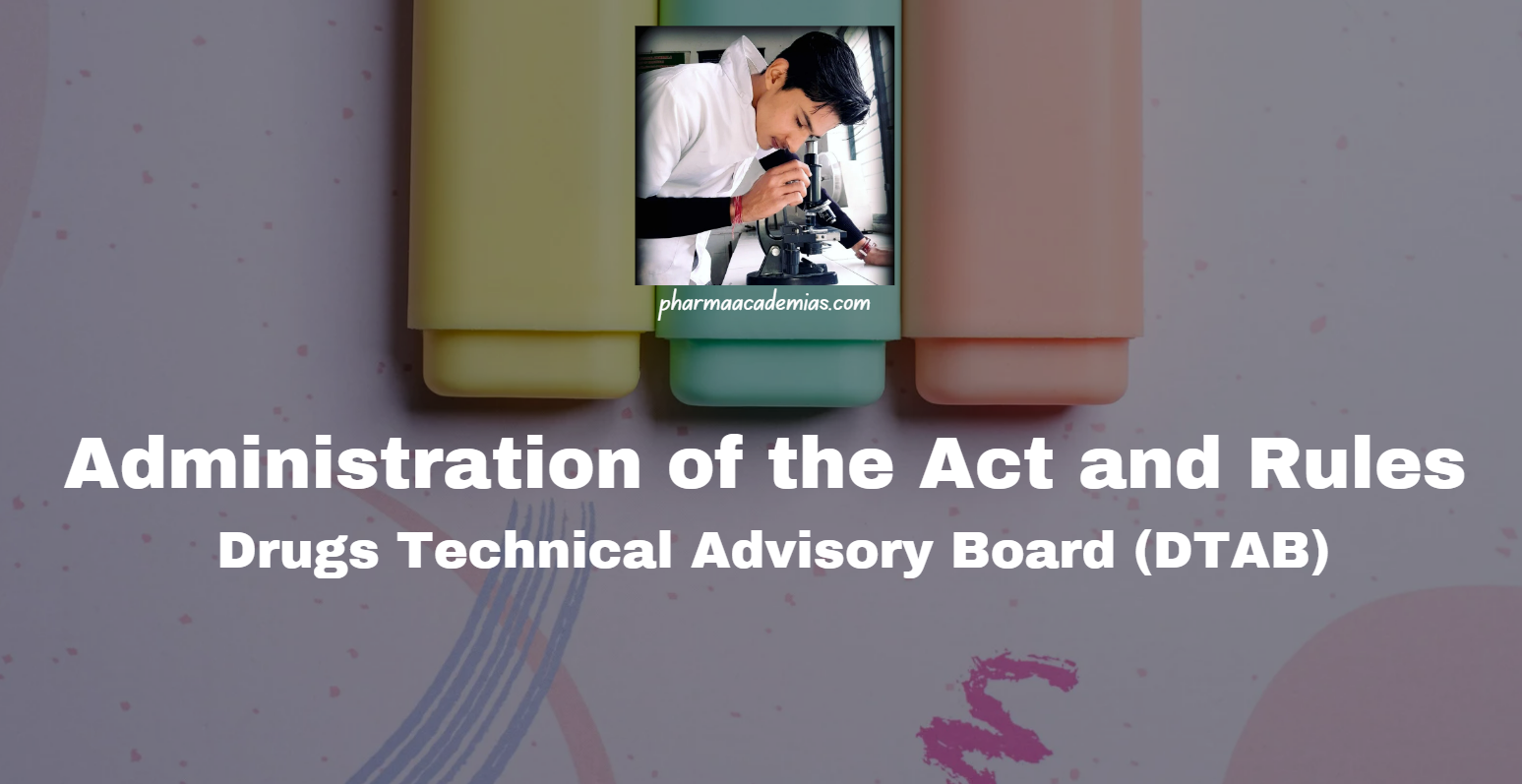The administration of drug regulation involves various bodies and mechanisms designed to ensure that pharmaceuticals are safe, effective, and of high quality. In many countries, the administration and oversight of drug regulations are supported by technical advisory boards or committees. One such key entity is the Drugs Technical Advisory Board (DTAB) in India. Below is a detailed note on the role, functions, and significance of the DTAB.
Drugs Technical Advisory Board (DTAB)
1. Establishment and Legal Framework:
Establishment: The DTAB was constituted under the provisions of the Drugs and Cosmetics Act, 1940, and the Rules thereunder.
Legal Framework: The Act and Rules provide the framework for DTAB’s operations, which includes advising on matters related to drug regulation, safety, efficacy, and quality control.
2. Composition:
Members: The DTAB is composed of experts and professionals from various fields related to pharmaceuticals, including:
Government Officials: Representatives from the Ministry of Health and Family Welfare, typically including the Director General of Health Services.
Experts: Experts in pharmacology, toxicology, clinical medicine, and pharmaceutical sciences.
Pharmaceutical Industry Representatives: Members from pharmaceutical companies, including manufacturers and distributors.
Medical Professionals: Physicians, surgeons, and other healthcare professionals with expertise in drug-related matters.
3. Appointment:
Chairperson: Appointed by the central government, usually a senior official from the Ministry of Health.
Members: Appointed by the central government based on recommendations from various professional bodies and associations.
Functions of the DTAB
1. Advisory Role:
Policy Recommendations: Advises the central government on policy matters related to the drugs and cosmetics industry.
Regulatory Guidelines: Provides recommendations for the formulation and revision of regulations and standards for drug approval, manufacturing, and marketing.
2. Technical Evaluation:
Drug Approval: Evaluates and makes recommendations on the approval of new drugs, including their safety, efficacy, and quality.
Clinical Trials: Reviews protocols for clinical trials and provides guidance on ethical considerations and safety measures.
3. Safety and Quality Control:
Adverse Drug Reactions: Reviews reports of adverse drug reactions and provides recommendations for regulatory actions.
Quality Standards: Advises on setting and updating quality standards for drugs and cosmetics, including testing methods and criteria.
4. Legislative Matters:
Amendments and Revisions: Reviews and suggests amendments to existing legislation and regulations related to drugs and cosmetics.
Implementation: Assists in the implementation of new laws and regulations by providing technical guidance and support.
5. Education and Training:
Guidance and Training: Provides guidance and training to regulatory authorities and stakeholders on best practices in drug regulation and safety.
Process and Procedures
1. Meetings:
Frequency: The DTAB meets periodically, as required, to discuss and deliberate on various issues. The frequency of meetings can vary based on the volume of matters to be addressed.
Agenda: Meetings are scheduled with a set agenda, including the review of specific drug approvals, regulatory proposals, and safety reports.
2. Decision-Making:
Consensus-Based: Decisions are typically made based on a consensus approach, with members discussing and agreeing on recommendations.
Documentation: Minutes of the meetings are documented and maintained for record-keeping and future reference.
3. Reporting:
Recommendations: The DTAB submits its recommendations to the central government and other relevant authorities.
Follow-Up: Recommendations may be followed up with additional consultations or actions as required.
Significance of the DTAB
1. Expertise and Guidance:
Informed Decisions: The DTAB provides expert guidance, ensuring that drug-related decisions are informed by the latest scientific knowledge and best practices.
Regulatory Compliance: Helps in aligning regulatory practices with international standards and ensuring compliance.
2. Public Safety:
Drug Safety: Plays a crucial role in safeguarding public health by ensuring that drugs and cosmetics meet safety and efficacy standards.
Quality Assurance: Ensures that products available to the public are of high quality and free from contaminants.
3. Legislative Support:
Regulatory Framework: Assists in shaping and updating the regulatory framework to address emerging challenges and advancements in the pharmaceutical industry.
4. Capacity Building:
Training and Education: Contributes to the capacity building of regulatory authorities and stakeholders through guidance and training.
Challenges and Considerations
1. Resource Constraints:
Funding and Infrastructure: Adequate resources and infrastructure are necessary for the effective functioning of the DTAB.
2. Complexity of Issues:
Emerging Technologies: The DTAB must continuously adapt to advancements in pharmaceuticals and address complex issues such as new drug technologies and global health challenges.
3. Stakeholder Engagement:
Balancing Interests: Engaging with a diverse group of stakeholders and balancing their interests can be challenging but is essential for effective regulation.
Conclusion
The Drugs Technical Advisory Board (DTAB) plays a pivotal role in the administration and oversight of drug and cosmetic regulations. By providing expert advice, evaluating drug safety and efficacy, and assisting in policy development, the DTAB contributes significantly to the safety and quality of pharmaceuticals and cosmetics. Its functions ensure that regulations remain robust, relevant, and aligned with international standards, ultimately safeguarding public health.

